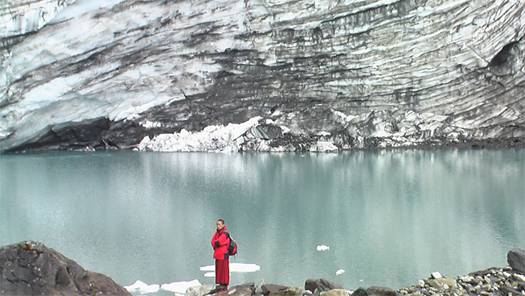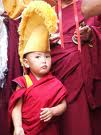The idea of reincarnation and the huge role that it plays in Tibetan Buddhism is a struggle for most Westerners to grasp. Israeli filmmaker Nati Baratz uses the story of a monk's search for the reincarnation of his own master to explore the power of that concept. Unmistaken Child is a new documentary that follows Tenzin Zopa as he embarks on what becomes a four-year search by foot, mule and helicopter for the reincarnation of Lama Konchog, a world-renowned Tibetan master. I spoke with writer and director Baratz about the challenges of building a documentary around a premise that many viewers will have a hard time accepting as simple fact .
What was your intention in making this film?
For me the project was an excuse to let the audience experience Tenzin Zopa, the film's hero, and the whole reincarnation search is just an outline of an interesting story.
When you first approached the families in the rural villages, was it daunting to have a camera along? How could it not interfere with the conversations and private moments Tenzin Zopa hoped to have with the families?
We were always as small as possible, a maximum of two people, and many times it was just me filming by myself. Secondly at each location it took several weeks or months to get to know people, and Tenzin was my door to everywhere. When he said he trusted me in many cases it was enough and if something did not work because of the camera I just went away.
When you do find what is the likely reincarnation, it is joyful and it is also sad. I can't stop thinking about the father saying that he has to think that giving up his son is for the the benefit of all sentient beings--otherwise how could he do it?
Many people find it offending but for me it is amazing. Honestly I felt I should not be there, it was a private moment but I just told myself to follow this along and to later decide if it's for the benefit of the intention of the film or just too private. Is it pornography or story telling? In editing I consulted with Tenzin and he agreed [with it]. So now it's in the movie.

How involved was Tenzin with the final cut?
At a few points I showed him scenes, like the scene when he was visiting his master 's cave for the first time since his death and he cries. First he said 'it's not such good thing for a monk to cry, he should cry from compassion not from losing his master, ' but then he thought it's good for the film. I was lucky enough to work with a smart, modern monk. In the final year he said 'it's your film, I don't need to see it , I trust you.' This February we were in Berlin at a film festival and Tenzin came and did some Q and A with me and I found out only one scene he didn't like. Can you guess which one?
Was it when the young boy gets his head shaved for the first time?
No. The only thing was the meeting with the Dalai Lama. In this scene the Dalai Lama offered [the boy] a white scarf and he tried to put on the Dalai Lama's neck. He was not bothered, but everyone else felt it was disrespectful. But after Tenzin saw it three more times with an audience and saw they liked it, he was OK with leaving it in.

There are just so many documentaries about Tibet right now. Do you think yours will demystify Tibetan Buddhism or make it more confusing to the average viewer?
Overall the film is an appreciation of Tibetan Buddhism because Tenzin is so human and so open and you can see his fears, his doubts,his humor, his hard work, and his faith. It's inspiring because of him. Regarding reincarnation, the Buddhists say 'don't believe what I say, check everything for yourself.' Saying anything precise about reincarnation is pretentious from my point of view. It is the biggest question of all and nothing you show in a film will ever convince someone either way, so it's better to leave it up to the audience.
What are some of the criticisms you've heard?
Time Out started a review saying 'I want to report a child abuse case' but then he gave the film a positive review although I don't know if anyone wants to see it after this.
I actually have a very practical question....how does a monk change the diaper of his master?
I hope you will see this on the DVD. I have a wonderful scene with Tenzin changing his diaper. Look , Tenzin is a very open minded monk. In the Galupa sect, nuns are not even allowed to do this, so Tenzin made sure to have two females-his aunts, I think- to live with him. At one point I saw Tenzin scold him and shout at him because he misbehaved and then after two minutes he prostrated in front of him and apologized. It's a very special way of raising a reincarnate child and I wish it could be part two of the film.

What about the boys parents?
The mother, she accepted it, but for the father it was hard. In the beginning he kept coming to the monastery; he had to walk four days to the road and then a 20 hour bus ride, but after a few months he came less and less and now they see him once a year. There is something I didn't put in the movie, but Tenzin offered the family to build a house below the monastery and the parents said they didn't want it. They didn't know what to do in a city. They wanted to stay in the house the family lived in for 700 years with their fields and their other kids. They are farmers not used to living in the city.
How does the little boy feel about them?
When i was with him he played less and less with the father. In the Dalai Lama's autobiography he described his lonely childhood and the strict schedule of learning. It's not easy to be a lama and you can see it in the film. It's not easy for Westerners to see that he was not allowed to play with regular children. But in general he is very happy and surrounded by love. You should remember that when the child is adult he can choose to dissolve this [and go back to civilian life].
Doe the family have any comment about the movie?
Tenzin made a copy for them but I don't know if they watched it yet.
What do you want people to walk away with?
I don't want to scare non Buddhists, so it's a hard question. It's a story of faith; the ultimate love story.
Did you consider yourself a Buddhist when you started ?
I'm not a Buddhist since I don't like labels. I try to practice and read and learn. Tenzin tried to convince me to take refuge (Buddhists are said to "take refuge" in, or to "go for refuge" to, the Three Jewels or tenets of Buddhism. This is often done formally in lay and monastic ordination ceremonies) but maybe I'm Buddhist without that.
This film is a refuge in a way...
It is.
You can hear more of my interview with Nati Baratz on The Tibet Connection.